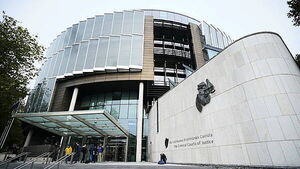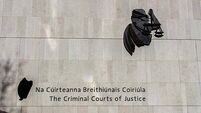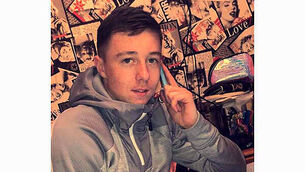Man (39) found not guilty of murder but guilty of manslaughter of his aunt's partner

Alison O'Riordan
An alcoholic who said he was acting in self-defence when he stabbed his aunt's "violent" partner 15 times has been found not guilty of murder but guilty of manslaughter by a Central Criminal Court jury.
The panel of three men and nine women unanimously rejected the prosecution case that Ryan Kearney was guilty of murder and that he had intentionally stabbed Jeffrey Jackson from "almost top to toe", intending to kill or cause serious injury.
Kearney (39), with an address at Loughnamona Drive, Leixlip, Co Kildare, had pleaded not guilty to murdering Mr Jackson (50) at The Lamps, School Street, Kilcock, Co Kildare on February 8th, 2024.
In seeking an outright acquittal for their client, Michael Bowman SC, defending, told the jury in his closing address that his client had not been the aggressor and had done no more than he believed necessary in the circumstances to defend himself.
Mr Bowman said his client was acting in self-defence when he fatally stabbed Mr Jackson, who counsel submitted was prone to "rage and violence" and who Kearney was "absolutely right" to call "a complete lunatic". He said his client was an alcoholic but whatever difficulties he had, he was not given to behaving in a manner involving violence and knives.
Whereas, Brendan Grehan SC with Edward Doocey BL, for the Director of Public Prosecutions, submitted in his closing speech that the defendant had "buried" the knife "to the hilt" in the fatal stabbing and that his account of giving "a few jabs to the stomach" in self-defence did not accord with the pathology evidence.
Mr Grehan said the deceased's remains were "the silent witness" in the case.
The defence had asked for an outright acquittal or a verdict of manslaughter on the basis of self-defence or the partial defence of provocation, which can reduce an intentional killing from murder to manslaughter.
The jury had the option of returning three verdicts in relation to the murder charge against Kearney, namely; guilty of murder, not guilty of murder but guilty of manslaughter or not guilty.
There were three pathways to the verdict of not guilty of murder but guilty of manslaughter because of absence of intent, the partial defence of self-defence or the partial defence of provocation.
In his charge to the jury, Mr Justice Paul Burns said they were being asked to determine whether the killing was murder or manslaughter or a lawfully justified homicide on the grounds of self-defence.
The judge said the jurors must consider the force used by Kearney if they accepted the defence of self-defence.
He said if the jury was satisfied, or left with a reasonable doubt, that the force used was what Kearney believed was necessary in the circumstances as he honestly believed them to be, but that a reasonable person would not have used the same degree of force as the defendant did, then the verdict should be not guilty of murder but guilty of manslaughter.
Mr Justice Burns also told the jurors that, only if the prosecution had satisfied them beyond a reasonable doubt that the defence of self-defence was not open to Mr Kearney, should they then consider whether the partial defence of provocation was open to the accused.
Provocation is a partial defence to a charge of murder which, if successful, reduces the offence from murder to manslaughter.
The 12 jurors took four hours and 47 minutes over two days to reject the prosecution case that evidence of the 16 separate knife injuries to Mr Jackson during what they argued was a "ferocious attack" in the Co Kildare apartment did not fit with Kearney's account of having stabbed the deceased in self-defence.
Mr Jackson's partner, Breda Kearney, has given evidence that when she returned home after a brief trip to the shop she was met by her bloodied nephew Ryan Kearney, who told her he had stabbed her partner in the neck and thought he was dead.
In his garda interviews, Kearney said that he took a knife off his aunt's enraged partner after a scuffle and gave him "a few jabs with it", telling detectives that he had no intention to kill and was in fear for his life.
The trial heard that Kearney had washed the knife and told gardaí he was leaving the apartment when he encountered his aunt.
"It was either going to be me sitting here today or him sitting here today," the defendant told officers.
The jurors also heard that Kearney told the first garda who arrived at the scene that it was "balaclava-clad men who had carried out the attack". The defendant later accepted this was a lie.
State pathologist Dr Sally Anne Collis gave evidence that Mr Jackson was more than eight times over the legal drink driving limit and died after sustaining 16 separate knife injuries.
The cause of death was two fatal wounds to the chest, one of which was 17cm in depth from a 12cm knife blade.
Following today's unanimous verdict, Mr Justice Burns thanked the jury for their time and exempted them from further service for the next seven years.
A sentence hearing for Kearney will take place on July 28th, and the judge remanded the defendant in custody until that date.
On that date, the Jackson family will have an opportunity to make a statement to the court about the impact Jeffrey's death has had on their lives.
The judge also directed a psychologist and a governor's report on the defendant. Mr Bowman told the court that his client had been diagnosed with PTSD and ADHD.
Evidence was given that when Kearney was charged with the murder of Mr Jackson on February 10th, he replied: "I stabbed Jeffrey but did not murder him, he was my friend, that's it".
Emma Farrell had told the trial that her husband Mr Jackson was an alcoholic who was physically abusive when drunk and that she had lived "in a constant state of fear" of being killed by him.
Ms Farrell said her husband's violence could "erupt spontaneously without any provocation" on her part and the deceased was "the type of guy who had no fear".
Gardaí told Kearney in his interviews that his account of stabbing Mr Jackson to death in self-defence did not make sense and put it to him that he had stabbed the deceased in the back, washed the knife and cleaned his hands.





